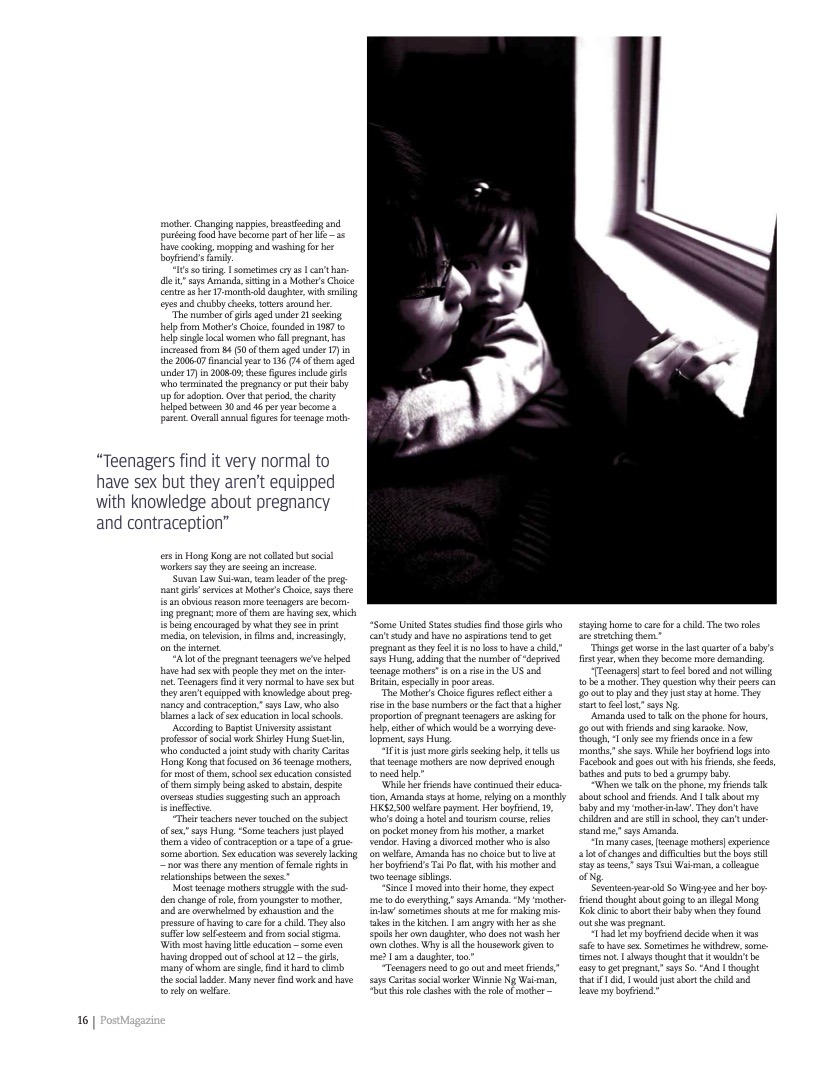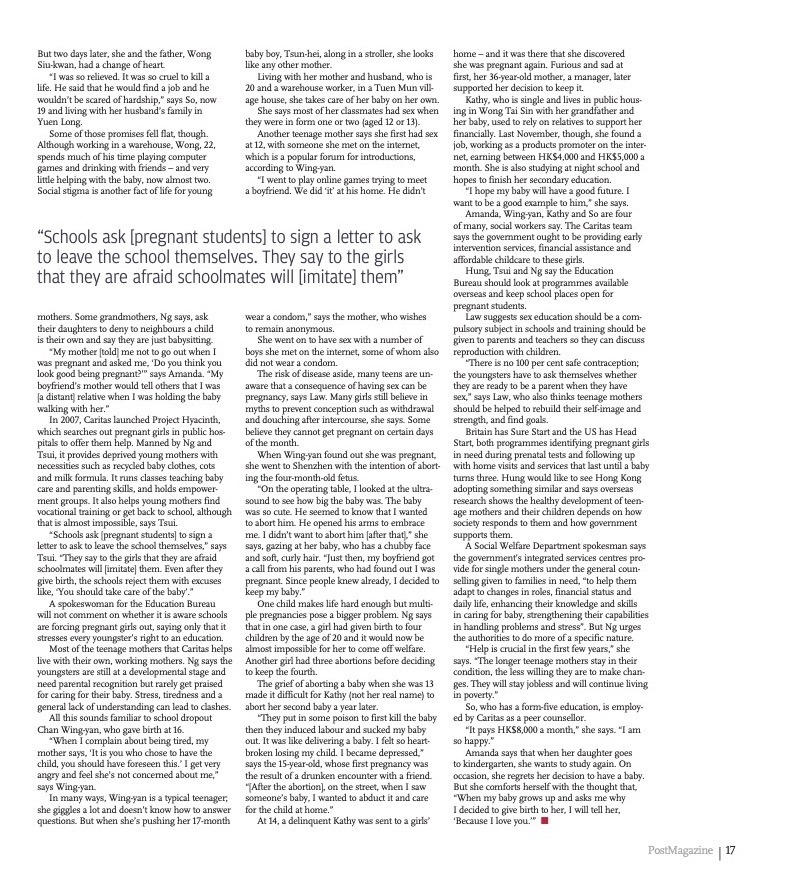First published in the South China Morning Post on 9 May 2010
Teenage mothers in Hong Kong can find themselves alienated from their peers and trapped in a life of drudgery with little to aim for. Sherry Lee looks at what is being done to help these youngsters.
‘I told my boyfriend that something was moving in my tummy. It was moving so much,’ says Amanda, 19. ‘He said it was probably my intestines and it wouldn’t be a worm.’
Amanda (not her real name) was 17 years old at the time and was sitting her Hong Kong Certificate of Education Examination. Even though she hadn’t menstruated for six months and had been gaining weight, it hadn’t occurred to her that she might be pregnant.
‘A classmate told me she didn’t have her period because she was stressed. I thought my late period was also due to [exam] stress,’ she says.
The movement in her stomach continued, though, so she went to a hospital, where a doctor told her the unwelcome news.
‘I told my boyfriend, who was waiting for me outside,’ she says. ‘He was shocked. Then I burst into tears.’
Her boyfriend’s mother tried to persuade Amanda to abort the baby.
‘His mother and my mother quarrelled. My ‘mother-in-law’ said she refused to recognise this grandchild. She said we were so young and would face a difficult road if we kept the baby.’
After weeks of turmoil, Amanda decided against a termination. ‘I couldn’t give up the baby. She accompanied me … everywhere. She was like a part of me,’ she says.
Twelve weeks later, the once-bubbly teenager became a mother. Changing nappies, breastfeeding and pureeing food have become part of her life – as have cooking, mopping and washing for her boyfriend’s family.
‘It’s so tiring. I sometimes cry as I can’t handle it,’ says Amanda, sitting in a Mother’s Choice centre as her 17-month-old daughter, with smiling eyes and chubby cheeks, totters around her.

The number of girls aged under 21 seeking help from Mother’s Choice, founded in 1987 to help single local women who fall pregnant, has increased from 84 (50 of them aged under 17) in the 2006-07 financial year to 136 (74 of them aged under 17) in 2008-09; these figures include girls who terminated the pregnancy or put their baby up for adoption. Over that period, the charity helped between 30 and 46 per year become a parent. Overall annual figures for teenage mothers in Hong Kong are not collated but social workers say they are seeing an increase.
Suvan Law Sui-wan, team leader of the pregnant girls’ services at Mother’s Choice, says there is an obvious reason more teenagers are becoming pregnant; more of them are having sex, which is being encouraged by what they see in print media, on television, in films and, increasingly, on the internet.
‘A lot of the pregnant teenagers we’ve helped have had sex with people they met on the internet. Teenagers find it very normal to have sex but they aren’t equipped with knowledge about pregnancy and contraception,’ says Law, who also blames a lack of sex education in local schools.
According to Baptist University assistant professor of social work Shirley Hung Suet-lin, who conducted a joint study with charity Caritas Hong Kong that focused on 36 teenage mothers, for most of them, school sex education consisted of them simply being asked to abstain, despite overseas studies suggesting such an approach is ineffective.
‘Their teachers never touched on the subject of sex,’ says Hung. ‘Some teachers just played them a video of contraception or a tape of a gruesome abortion. Sex education was severely lacking – nor was there any mention of female rights in relationships between the sexes.’
Most teenage mothers struggle with the sudden change of role, from youngster to mother, and are overwhelmed by exhaustion and the pressure of having to care for a child. They also suffer low self-esteem and from social stigma. With most having little education – some even having dropped out of school at 12 – the girls, many of whom are single, find it hard to climb the social ladder. Many never find work and have to rely on welfare.
‘Some United States studies find those girls who can’t study and have no aspirations tend to get pregnant as they feel it is no loss to have a child,’ says Hung, adding that the number of ‘deprived teenage mothers’ is on a rise in the US and Britain, especially in poor areas.
The Mother’s Choice figures reflect either a rise in the base numbers or the fact that a higher proportion of pregnant teenagers are asking for help, either of which would be a worrying development, says Hung.
‘If it is just more girls seeking help, it tells us that teenage mothers are now deprived enough to need help.’
While her friends have continued their education, Amanda stays at home, relying on a monthly HK$2,500 welfare payment. Her boyfriend, 19, who’s doing a hotel and tourism course, relies on pocket money from his mother, a market vendor. Having a divorced mother who is also on welfare, Amanda has no choice but to live at her boyfriend’s Tai Po flat, with his mother and two teenage siblings.
‘Since I moved into their home, they expect me to do everything,’ says Amanda. ‘My ‘mother-in-law’ sometimes shouts at me for making mistakes in the kitchen. I am angry with her as she spoils her own daughter, who does not wash her own clothes. Why is all the housework given to me? I am a daughter, too.’

‘Teenagers need to go out and meet friends,’ says Caritas social worker Winnie Ng Wai-man, ‘but this role clashes with the role of mother – staying home to care for a child. The two roles are stretching them.’
Things get worse in the last quarter of a baby’s first year, when they become more demanding.
‘[Teenagers] start to feel bored and not willing to be a mother. They question why their peers can go out to play and they just stay at home. They start to feel lost,’ says Ng.
Amanda used to talk on the phone for hours, go out with friends and sing karaoke. Now, though, ‘I only see my friends once in a few months,’ she says. While her boyfriend logs into Facebook and goes out with his friends, she feeds, bathes and puts to bed a grumpy baby.
‘When we talk on the phone, my friends talk about school and friends. And I talk about my baby and my ‘mother-in-law’. They don’t have children and are still in school, they can’t understand me,’ says Amanda.
‘In many cases, [teenage mothers] experience a lot of changes and difficulties but the boys still stay as teens,’ says Tsui Wai-man, a colleague of Ng.
Seventeen-year-old So Wing-yee and her boyfriend thought about going to an illegal Mong Kok clinic to abort their baby when they found out she was pregnant.
‘I had let my boyfriend decide when it was safe to have sex. Sometimes he withdrew, sometimes not. I always thought that it wouldn’t be easy to get pregnant,’ says So. ‘And I thought that if I did, I would just abort the child and leave my boyfriend.’
But two days later, she and the father, Wong Siu-kwan, had a change of heart.
‘I was so relieved. It was so cruel to kill a life. He said that he would find a job and he wouldn’t be scared of hardship,’ says So, now 19 and living with her husband’s family in Yuen Long.
Some of those promises fell flat, though. Although working in a warehouse, Wong, 22, spends much of his time playing computer games and drinking with friends – and very little helping with the baby, now almost two.
Social stigma is another fact of life for young mothers. Some grandmothers, Ng says, ask their daughters to deny to neighbours a child is their own and say they are just babysitting.
‘My mother [told] me not to go out when I was pregnant and asked me, ‘Do you think you look good being pregnant?” says Amanda. ‘My boyfriend’s mother would tell others that I was [a distant] relative when I was holding the baby walking with her.’
In 2007, Caritas launched Project Hyacinth, which searches out pregnant girls in public hospitals to offer them help. Manned by Ng and Tsui, it provides deprived young mothers with necessities such as recycled baby clothes, cots and milk formula. It runs classes teaching baby care and parenting skills, and holds empowerment groups. It also helps young mothers find vocational training or get back to school, although that is almost impossible, says Tsui.
‘Schools ask [pregnant students] to sign a letter to ask to leave the school themselves,’ says Tsui. ‘They say to the girls that they are afraid schoolmates will [imitate] them. Even after they give birth, the schools reject them with excuses like, ‘You should take care of the baby’.’

A spokeswoman for the Education Bureau will not comment on whether it is aware schools are forcing pregnant girls out, saying only that it stresses every youngster’s right to an education.
Most of the teenage mothers that Caritas helps live with their own, working mothers. Ng says the youngsters are still at a developmental stage and need parental recognition but rarely get praised for caring for their baby. Stress, tiredness and a general lack of understanding can lead to clashes.
All this sounds familiar to school dropout Chan Wing-yan, who gave birth at 16.
‘When I complain about being tired, my mother says, ‘It is you who chose to have the child, you should have foreseen this.’ I get very angry and feel she’s not concerned about me,’ says Wing-yan.
In many ways, Wing-yan is a typical teenager; she giggles a lot and doesn’t know how to answer questions. But when she’s pushing her 17-month baby boy, Tsun-hei, along in a stroller, she looks like any other mother.
Living with her mother and husband, who is 20 and a warehouse worker, in a Tuen Mun village house, she takes care of her baby on her own.
She says most of her classmates had sex when they were in form one or two (aged 12 or 13).
Another teenage mother says she first had sex at 12, with someone she met on the internet, which is a popular forum for introductions, according to Wing-yan.
‘I went to play online games trying to meet a boyfriend. We did ‘it’ at his home. He didn’t wear a condom,’ says the mother, who wishes to remain anonymous.
She went on to have sex with a number of boys she met on the internet, some of whom also did not wear a condom.
The risk of disease aside, many teens are unaware that a consequence of having sex can be pregnancy, says Law. Many girls still believe in myths to prevent conception such as withdrawal and douching after intercourse, she says. Some believe they cannot get pregnant on certain days of the month.
When Wing-yan found out she was pregnant, she went to Shenzhen with the intention of aborting the four-month-old fetus.
‘On the operating table, I looked at the ultrasound to see how big the baby was. The baby was so cute. He seemed to know that I wanted to abort him. He opened his arms to embrace me. I didn’t want to abort him [after that],’ she says, gazing at her baby, who has a chubby face and soft, curly hair. ‘Just then, my boyfriend got a call from his parents, who had found out I was pregnant. Since people knew already, I decided to keep my baby.’
One child makes life hard enough but multiple pregnancies pose a bigger problem. Ng says that in one case, a girl had given birth to four children by the age of 20 and it would now be almost impossible for her to come off welfare. Another girl had three abortions before deciding to keep the fourth.
The grief of aborting a baby when she was 13 made it difficult for Kathy (not her real name) to abort her second baby a year later.
‘They put in some poison to first kill the baby then they induced labour and sucked my baby out. It was like delivering a baby. I felt so heartbroken losing my child. I became depressed,’ says the 15-year-old, whose first pregnancy was the result of a drunken encounter with a friend. ‘[After the abortion], on the street, when I saw someone’s baby, I wanted to abduct it and care for the child at home.’
At 14, a delinquent Kathy was sent to a girls’ home – and it was there that she discovered she was pregnant again. Furious and sad at first, her 36-year-old mother, a manager, later supported her decision to keep it.
Kathy, who is single and lives in public housing in Wong Tai Sin with her grandfather and her baby, used to rely on relatives to support her financially. Last November, though, she found a job, working as a products promoter on the internet, earning between HK$4,000 and HK$5,000 a month. She is also studying at night school and hopes to finish her secondary education.
‘I hope my baby will have a good future. I want to be a good example to him,’ she says.
Amanda, Wing-yan, Kathy and So are four of many, social workers say. The Caritas team says the government ought to be providing early intervention services, financial assistance and affordable childcare to these girls.
Hung, Tsui and Ng say the Education Bureau should look at programmes available overseas and keep school places open for pregnant students.
Law suggests sex education should be a compulsory subject in schools and training should be given to parents and teachers so they can discuss reproduction with children.
‘There is no 100 per cent safe contraception; the youngsters have to ask themselves whether they are ready to be a parent when they have sex,’ says Law, who also thinks teenage mothers should be helped to rebuild their self-image and strength, and find goals.
Britain has Sure Start and the US has Head Start, both programmes identifying pregnant girls in need during prenatal tests and following up with home visits and services that last until a baby turns three. Hung would like to see Hong Kong adopting something similar and says overseas research shows the healthy development of teenage mothers and their children depends on how society responds to them and how government supports them.
A Social Welfare Department spokesman says the government’s integrated services centres provide for single mothers under the general counselling given to families in need, ‘to help them adapt to changes in roles, financial status and daily life, enhancing their knowledge and skills in caring for baby, strengthening their capabilities in handling problems and stress’. But Ng urges the authorities to do more of a specific nature.
‘Help is crucial in the first few years,’ she says. ‘The longer teenage mothers stay in their condition, the less willing they are to make changes. They will stay jobless and will continue living in poverty.’
So, who has a form-five education, is employed by Caritas as a peer counsellor.
‘It pays HK$8,000 a month,’ she says. ‘I am so happy.’
Amanda says that when her daughter goes to kindergarten, she wants to study again. On occasion, she regrets her decision to have a baby. But she comforts herself with the thought that, ‘When my baby grows up and asks me why I decided to give birth to her, I will tell her, ‘Because I love you‘.”
The article was first published in the Post Magazine of SCMP on 9 May 2010, and it is now reprinted with the consent of the writer Sherry Lee, at a time when Hong Kong debates on the government’s strategy for sex education in secondary schools.